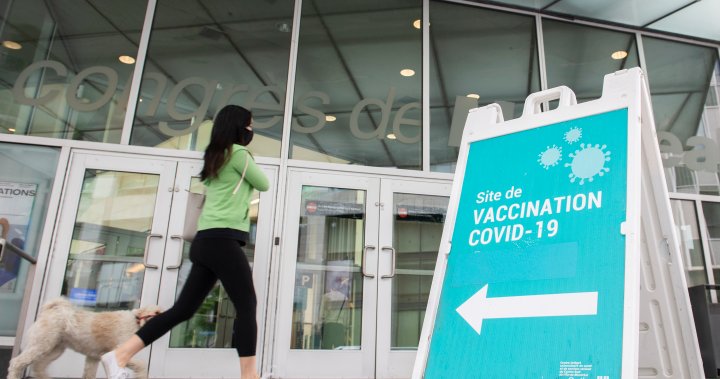While COVID-19 may still be transmissible between vaccinated individuals, the ability of vaccinations to prevent serious illness will keep extreme restrictions — such as lockdowns — from making a comeback, medical experts say.
Israel recently found that the Pfizer-BioNTech vaccine’s effectiveness in preventing both infection and symptomatic disease fell to 64 per cent since June 6, its health ministry said.
Read more:
Israel reports drop in Pfizer vaccine’s effectiveness in preventing COVID-19 infection
However, the vaccine was 93 per cent effective in preventing hospitalizations and serious illness from the coronavirus.
University of Toronto epidemiologist Colin Furness said that the rate of transmission is still the most important metric to follow even amid a fully vaccinated population because it shows the trajectory of the virus and its burden on the population.
If transmission rates remain high, there is the potential the virus could mutate further and become more resistant to current vaccines, and there is also the risk of “long-haul COVID,” which can leave recipients with lasting heart, lung and brain damage, Furness said.
He pointed to a U.K. study that found among children who were symptomatic of COVID-19, 25 per cent had symptoms of long-haul COVID.

Some restrictions and personal measures will still be necessary, Furness said, to keep cases as low as they can be.
He pointed out that Israel had dropped its mask mandate, which may have contributed to its higher rates of transmission among vaccinated individuals.
“Vaccination is not the whole picture here. It’s the foundation,” he said. “But you still need other restrictions to stamp out COVID.”
However, Furness doesn’t foresee strict restrictions such as a lockdown returning, as vaccinations will prevent ICU beds from running out, which was the reason lockdowns were necessary in the first place.
Over 78 per cent of eligible Canadians over 12-years-old have received the first dose of vaccine and over 42 per cent of eligible Canadians have received a second dose, according to COVID-19 Tracker.
Read more:
Toronto hospital ICU marks having no active COVID-19 patients for first time in nearly 15 months
“Vaccination will actually take us far enough along, not that we’re out of the woods, but that we’re really out of the fire,” he said.
University of Toronto biomedical engineer professor Dr. Omar Khan said that there are two kinds of efficacies for vaccines: its ability to prevent infection, and its ability to prevent severe disease.
The approved COVID-19 vaccines’ ability to prevent infection is not as high as their ability to prevent disease, but nevertheless, if there is transmission between two vaccinated people, their immune systems have a better shot at knocking it out.

Once your immune system kills the virus, then you won’t transmit it, which he said will be “really helpful to eventually stop the virus.”
Khan said while transmissions may still occur, vaccines ultimately provide personal protection to keep you out of the ICU.
“Trying to get through a natural infection and survival is not a fun thing,” he said. “You can do it a lot faster, a lot less energy [with vaccines].”
View link »
© 2021 Global News, a division of Corus Entertainment Inc.














































